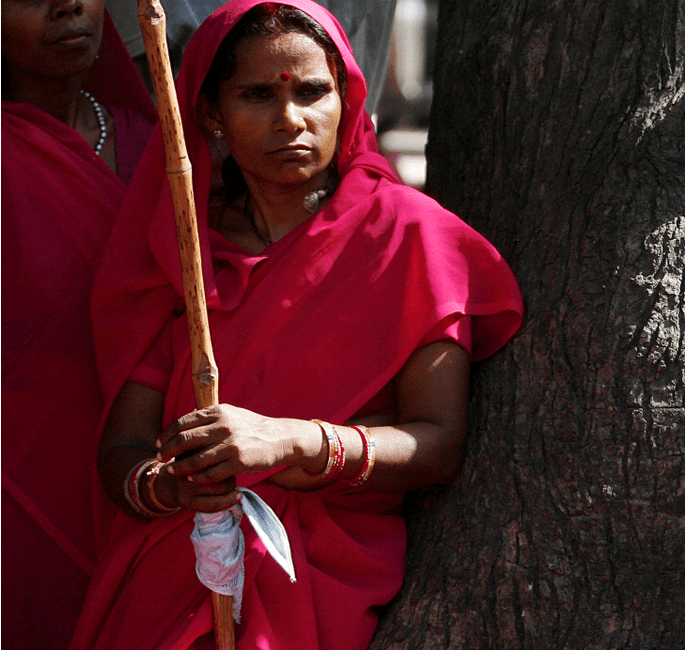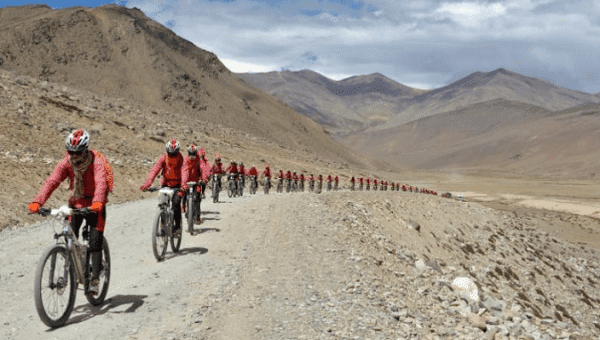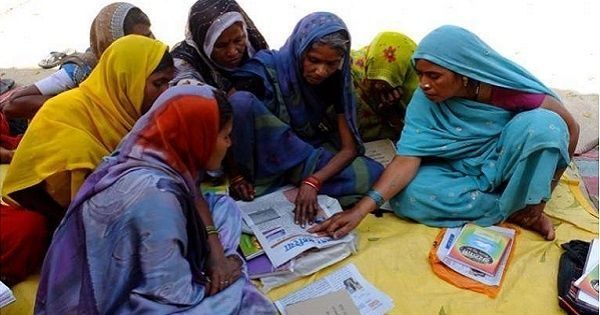This year, the #MeToo movement became a rallying cry for women seeking justice for the times men have exploited and abused them, physically, emotionally or psychologically. It represents a significant victory for womankind, but like many mainstream movements it has kept the voices of marginalized women largely subdued. Instead, the likes of Taylor Swift, Alyssa Milano and Ashley Judd are the faces of the reckoning: almost exclusively white and almost exclusively famous.
"I think the floodgates have opened for White women," Black actress Gabriella Union said in a New York Times article. "I don't think it's a coincidence whose pain has been taken seriously. Whose pain we have showed historically and continued to show. Whose pain is tolerable and whose pain is intolerable. And whose pain needs to be addressed now."
Critics are still debating whether the #MeToo movement is really reaching women at the periphery: women working in hotels, diners and factories, who – along with the elite stars of Hollywood – also suffer by virtue of simply being women, albeit rather less high-profile.
Harlem-based social activist Tarana Burke, who launched the original #MeToo movement, first used the phrase in 2006 to connect with young women of color. "From the start of #MeToo going viral and the recognition of my years of work preceding it, I have been happily allowing this wave of attention to shine a much-needed light on the fight to end gender-based violence," she writes in the Washington Post. "I founded the #MeToo movement in 2006 because I wanted to find a way to connect with the Black and Brown girls in the program I ran, but if I am being honest with myself, and you, I often wonder if that sister in the diner has even heard of #MeToo, and if she has, does she know it's for #UsToo?"
As heartwrenching #MeToo testimonies peak on social media across the world, other grassroots all-female collectives are also continuing their years-long efforts to safeguard marginalized women in their respective societies.
Gulabi Gang of India

These rural women, clad in pink saris, wield their bamboo sticks or "lathis" against the men who dare to harass them. They are the modern all-female vigilante group India needs to safeguard women, especially those belonging to the most vulnerable sections of Indian society.
Gulabi translates as the color pink in Hindi, one of the native Indian languages. The group, with tens of thousands of members, was created by Sampat Pal Devi after a brutal domestic violence case was brought to light in the region 11 years ago. Today, it spans the north Indian state of Uttar Pradesh, one of the most dangerous places for women to live in India.
"When a woman seeks membership in the Gulabi Gang, it is because she has suffered injustice, has been oppressed and does not see any other recourse," Suman Singh, the group's deputy commander from Mahoba district, told Al Jazeera. "All our women can stand up to the men and if need be seek retribution through lathis."
In 2011, The Guardian newspaper named the founder of the Gulabi Gang, Pal, as one of the 10 most influential women in the world.
"Yes, we fight rapists with lathis [sticks]. If we find the culprit, we thrash him black and blue so he dare not attempt to do wrong to any girl or a woman again," Pal told Al Jazeera.
Journalist and author of "Pink Saree Revolution," Amana Fontanella Khan, told Al Jazeera: "The justice system in Bundelkhand is dysfunctional and unreliable," noting that Devi was hell-bent on empowering women and filling the void left by the judicial system's failings.
"The Gulabi Gang has stepped into the vacuum left by the state and offers an alternative means of attaining justice."
Black Mambas of Zimbabwe

Named after the venomous snake endemic to parts of sub-Saharan Africa, Black Mamba is the world's first all-female anti-poaching squad in a region plagued by the illegal hunting of rhinoceroses and elephants.
The award-winning nonprofit, with nearly 36 female rangers between the ages 19 and 33, was founded in 2013 by Transfrontier Africa NPC to protect the Olifants West Region of Balule Nature Reserve, part of the Greater Kruger National Park.
The group operates to "Saturate the landscape, make them (the group members) visible wearing badges, practice early detection, and then call in an armed response," Craig Spencer, founder and head warden at Balule Nature Reserve, told the National Geographic.
Many women in this badass squad come from disadvantaged backgrounds. They are unemployed single mothers; victims of sexual and physical abuse; wives of poachers already in prison, and widows or orphans.
"I've been doing this for 24 years and have never had to raise a weapon to a wild animal," Spencer said. "The poachers would have to consider defending themselves against these women. Creating orphans and widows is not the answer to this problem. You can't shoot this problem away. Early detection is their key role."
Rhino poaching is a real problem in the region. According to a recent African Wildlife Fund report, rhino poaching increased by more than 9,000 percent between 2007 and 2014, rising from 13 animals per year to 1,215 per year.
Comando Colibri of Mexico
A group of women in Mexico decided to form a feisty self-defense program to deal with the everyday harassment women are so often exposed to in the country.
The group exudes fierce feminism, with a motto of setting themselves free from gender colonialism, including victimization, in order to become physically, mentally and emotionally indomitable.
"As a guerrilla commando, we do not want the mediocre rights of men nor their hypocritical tolerance nor their weak respect," warns their official website. "We want to dynamite everything: the state, capital, racism, coloniality, family, oppressive religions, to the transnationals, to the transgenics, to the banks, to the ideas that the woman is first of all a mother, to sexuality as a device, to heterosexuality as a norm. Neither God nor state nor party nor husband. Our demand is one and only one: to build the conditions for the possibility of a hope of utopia."
'Kung Fu' Nuns of Nepal

Buddhist nuns at the Druk Gawa Khilwa convent in Kathmandu, Nepal, are the only female order practicing Kung Fu. Most of them have black belts and say practicing has made them more self-confident, stronger and resilient. They are also able to meditate for long periods of time while praying.
Traditionally, nuns are expected to cook and clean and are not permitted to engage in sports, but this changed a decade ago when the leader of the 1,000-year-old sect, His Holiness The Gyalwang Drukpa, encouraged his female charges to learn the martial art.
"People think that because we are nuns we are supposed to stay in the temples and pray all the time, but praying is not enough," 18-year-old Jigme Konchok Lhamo told Reuters.
Thanks to the progressive stance of Drupka, who was inspired by his mother to become an advocate for gender equality, the number of Kung Fu nuns has grown from 30 to 500 over the past 12 years.
They are the only female order in the otherwise patriarchal Buddhist monastic system where nuns enjoy equal status with monks.
Fighting patriarchy and learning to defend themselves is at the heart of their training objectives. "Most of the people, when they see us on our bikes, think we are boys," Wangchuk Lhamo, told Reuters.
"Then they get shocked when we stop and tell them that not only are we girls, but we are also Buddhist nuns. I think this helps change their attitudes about women and maybe value them as equals."
Every day at the convent, nearly 350 nuns between the ages 10 and 25 attend three intensive training sessions.
As many as 200 are currently preparing for a 30-day bike ride to spread awareness of human trafficking, which has risen in the region since the 2015 Nepal Earthquake.
Khabar Lahariya of India

With no road maps, water or electricity, a group of rural women in India decided to use the power of the pen more than a decade ago to tell the stories that weren't being told and to address local issues with a feminist perspective.
Started in 2002, Khabar Lahariya – or News Waves – is a rural, women-run local newspaper.
"We are clear that we want a certain voice, the voice of a rural marginalized Dalit woman (or) a Muslim woman," co-founder Disha Mullick told teleSUR. "These voices are not visible in the media: you don't hear them, you don't see them, you don't read their bylines. We think it's important that the media narrative is informed by the voices of women on the margins."
Kavita Devi, co-founder and digital editor, didn't get the chance to attend school: she was married as soon as she turned 12.
"I knew how my name sounded, but when I learned to write I liked it even more. While helping my parents at the farm, I'd practice writing words over mud with a stick," she told teleSUR in a phone interview.
Her interest in learning grew stronger and, in defiance of her father, she decided to enroll in school: a small non-profit made which encouraged female literacy made it possible.
The collective now consists of nearly 40 women and the newspaper covers nine districts in the northern states of Uttar Pradesh and Bihar. It is distributed in almost 600 villages weekly, reaching an estimated readership of 80,000 people.
It is printed in the rural dialects spoken in the region: Hindi, Bundeli, Bhojpuri and Awadhi. The women are trained by a team of senior journalists, enabling them to write, edit, produce, distribute and market the newspaper.
"Most households aren't supportive of women stepping outside of their homes and, as a result, because of family pressure we lose many reporters in a very short span of time," Devi said. "This work is not for the faint-hearted: people can often resort to using foul language, one might receive death threats."